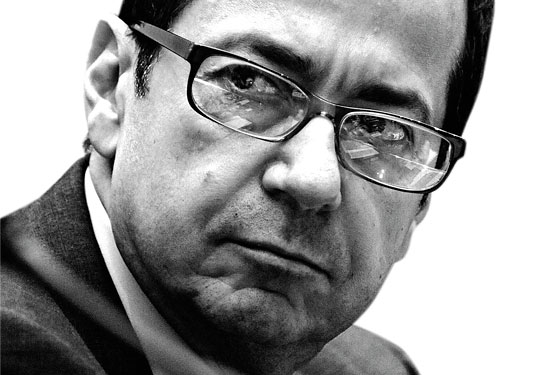
John Paulson emerged from the mortgage bust a very clever hero. Yes, he was a billionaire hedge-fund manager at a time when Wall Street was in serious disrepute. But the contrarian who had the foresight to bet against the housing bubble, taking home what might be the biggest windfall in Wall Street history, became the redemptive face of hedge-funders. And best of all, as was inevitably pointed out, he’s from Queens and didn’t come across as one of the profligate financiers—with their private jets and parties at Art Basel Miami Beach—from the boom.
In the pages of The Wall Street Journal, Paulson counseled the government on the best rescue plan for Wall Street. When Paulson and the other hedge-fund winners of the crash were called to explain themselves in congressional hearings, the planned inquisition turned into something a lot more like a polite seminar on finance—a chance for Paulson to tell Congress it should get a better deal on the bailout, his fellow billionaire Jim Simons to advocate making deals with home owners, and Ken Griffin to wryly express regret that he’d put so much of his own money in the least profitable of his funds. The hedge-fund guys were actually having fun.
Last year, Paulson seemed securely an example to emulate, his brilliant mortgage bet admiringly chronicled in Journal reporter Gregory Zuckerman’s book The Greatest Trade Ever. But one of the very deals Zuckerman describes is now at the center of Securities and Exchange Commission fraud charges against Paulson’s bankers at Goldman Sachs, the firm that, not coincidentally, managed to escape the collapse largely unscathed. For Paulson to bet that mortgage bonds would crash, the SEC charges, his Goldman bankers tricked other investors into betting that they would not. Now an angry band of Wall Street critics, such as economist Simon Johnson, are clamoring for Paulson to get charged along with Goldman.
Here you see an iron law of finance in operation: For every brilliant contrarian who makes money, there is a fool on the other side of the deal. If you see the markets as an epic battle of wits—as does the Journal’s editorial page, which calls the Goldman charges not the smoking gun but the “water pistol” of the financial crisis—this may not be much of a problem. It’s like the discovery that boxers pummel each other in the ring. If finance is an exciting spectator sport, who manipulates whom is part of the fun of a contest that might best be summed up by Shakespeare’s Timon: “Rob one another … All that you meet are thieves!”
As long as the stakes are distant and abstract, skill in finance is impressive and admirable, like skill at chess. But as the stakes rise, as they so spectacularly have in the crisis, eventually it looks much more sinister. The investors who were not so long ago merely fools (albeit, in many cases, bailed-out ones, by the federal government) are now, in the wake of the SEC charges, recast as misled and manipulated suckers. The whiz kid who predicted the crash easily turns in the public eye into the manipulator who exacerbated it. And suddenly being known as the cleverest hedge-fund manager of all is no longer so great. It’s a pattern that Paulson himself may well have learned in Queens public schools: The smarty-pants eventually has his day of reckoning in the schoolyard.
Have good intel? Send tips to intel@nymag.com.